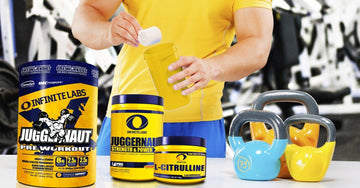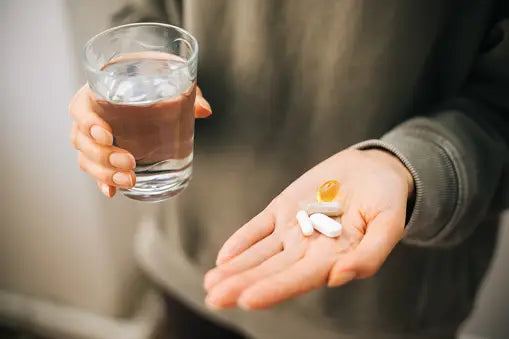

JUGGERNAUT X - YOUR ULTIMATE PRE WORKOUT EXPERIENCE
Table of Contents
JUGGERNAUT X is your ultimate pre-workout supplement for energy, endurance and pumps. It's a complete all-in-one formula that has everything you need to take your workouts to the next level. With clinically dosed ingredients that are backed by science, JUGGERNAUT X is the most effective pre-workout on the market. If you're looking for an edge in the gym, JUGGERNAUT X is your answer.
Let’s check out the scientifically researched based pre-workout ingredients of Juggernaut X the best pre-workout supplement.
Agmatine
Agmatine is a unique nutrition ingredient capable of providing enormous benefits to anyone looking to improve their mental and physical performance. Agmatine biosynthesis by arginine decarboxylation is well positioned to compete with the principal arginine-dependent pathways, namely: Nitrogen metabolism (urea cycle), polyamine and NO synthesis, as well as protein synthesis. Studies show that agmatine has cardio-protective and supportive benefits through (among other actions) its impact on nitric oxide regulation, neuroprotective benefits through its role as a modulator and supportive agent for neurotransmitters, and cognitive/mood-supporting benefits through its combined influences on nitric oxide synthesis and neurotransmitter modulation.
Agmatine is a neurotransmitter that works in a variety of ways to improve mental and physical health. Agmatine not only promotes the pump that will flood the targeted muscle with blood, and essentially, nutrients. It also improves insulin sensitivity and glucose metabolism, acts as an anti-inflammatory and increases secretion of beta-endorphin (which is essentially a ‘feel-good’ neurotransmitter.) Agmatine contains antidepressant properties and anxiolytic (anxiety reliever) which can be beneficial in the heavy loading and high-stress exercise.

Creatine
First discovered in 1832, creatine is an amino acid-like compound made in the liver, kidneys and pancreas from arginine, glycine, and methionine. Dietary sources of creatine include meat, fish, and poultry. Adults and teenagers who regularly consume these foods typically eat 1-2 grams of creatine per day, an amount that is roughly equal to the body’s rate of creatine degradation. In a normal, healthy adult male, 95% of creatine stores are found in skeletal muscle, while the remaining 5% is found in the heart, brain, eyes, kidneys, and testes. Since 1992, over 300 research papers have been published on the effects of creatine as a muscle builder and performance enhancer. In general, the majority (~ 65-70%) of these clinical trials have found beneficial effects from creatine monohydrate supplementation, particularly during short, repeated bursts of high-intensity activity. Although responses are variable from person to person, subjects ingesting creatine average a 2-5-pound greater gain in muscle mass, and 5-15% greater increases in muscle strength and power compared to control (or placebo) subjects. Vegetarians who consume no animal products are likely to experience even greater benefits from creatine use.
Creatine loading is unnecessary. Daily doses of 3-5 grams, depending on bodyweight, is sufficient to increase intramuscular stores of creatine and improve muscle mass and performance within 30-days.
A useful analogy is that creatine is to the strength/power and repeated sprint athlete what carbohydrate is to the endurance athlete. In other words, the physiological functions of creatine enhance energy production during intense, repeated muscular activity. More specifically, following its transport and uptake into muscle, creatine is thought to serve at least four vital functions: 1) it serves as an energy capacitor, storing energy which can be used to regenerate adenosine triphosphate (ATP); 2) it enhances the capacity for energy transfer between the mitochondria and muscle fibers; 3) it serves as a buffer against intracellular acidosis during exercise; and 4) it activates glycogenolysis (glycogen breakdown) during exercise. Collectively, these effects allow athletes to perform at higher levels during training, ultimately leading to greater increases in muscle mass, strength, power, and high-intensity muscle endurance. Recent studies have also focused on the potential benefits of creatine use on certain neurological and cardiovascular diseases.
Initial recommendations for creatine use stemmed from early research using 5-7 days of “loading” with 20-30 grams per day (divided into 4-6 equal, 5-gram doses). Based on new research, refinements have been made to this strategy, and now many athletes consume only one, 5-gram dose approximately 60 minutes before, or immediately after training (exercise is known to enhance creatine uptake by about 10%).
Although still somewhat speculative, creatine cycling (i.e., 4-weeks of use followed by a 4-week break) is supported by studies showing that once muscle stores of creatine are full, they can remain elevated (and performance enhanced) for an additional 4-5 weeks without supplementing at all. In normal, healthy men and women, daily supplementation with 3-5 grams per day of creatine appears to pose no adverse health risks. Long-term use of higher doses (≥ 10 g/day) is not recommended because research on this type of creatine usage is not yet available. Creatine loading is unnecessary. Daily doses of 3-5 grams, depending on bodyweight, is sufficient to increase intramuscular stores of creatine and improve muscle mass and performance within 30-days.
In a study in the Journal of Molecular and Cellular Endocrinology, researchers examined how creatine impacted myostatin levels in resistance-trained men.
Creatine may also increase muscle mass by reducing myostatin levels. In a study in the Journal of Molecular and Cellular Endocrinology, researchers examined how creatine impacted myostatin levels in resistance-trained men. In a double-blind design, 27 healthy male subjects were assigned to resistance training and creatine supplementation groups. Amazingly, the study found that creatine supplementation added to a resistance-training program amplifies the training-induced decrease in serum levels of myostatin, increasing the effects of exercise on muscle strength and mass. Creatine is also effective in sharpen the mental focus and boost energy levels. Other studies have reported that ingestion of creatine enhances muscle IGF-1 responses as well in conjunction with increasing satellite cell activation.
Regarding bodybuilding performance, beta-alanine increased total work capacity by 13% after 4-weeks, and 16% after 10-weeks. In contrast, no changes occurred in the placebo group.

Beta-alanine is an amino acid that, with the help of another amino acid called histidine, helps form a compound called carnosine in muscle. Carnosine, in turn, is one of the most powerful pH (acid) buffers known to operate in muscle during intense exercise. Over the past fourteen years, research from five countries (Japan, the United Kingdom, Korea, Russia, and the United States) has been accumulating on the potential benefits of beta-alanine supplementation in humans. To put it simply, if high-intensity workouts are your thing, beta-alanine will help you reach new levels of performance. For example, a placebo-controlled double-blind study of 33 men was recently undertaken at The College of New Jersey. After being placed into a creatine only (10.5 grams/day), creatine + beta alanine (10.5 grams creatine + 3.2 grams/day beta alanine), or placebo (10.5 grams/day of dextrose) group, subjects underwent 10-weeks of resistance training. Researchers reported that subjects in the creatine + beta-alanine group gained significantly more lean mass (~ 4 lbs.) and lost more body fat than subjects in the other two groups. Also, fatigue rates during training were lowest, and training volume was highest, respectively, in the creatine + beta-alanine group.
In another study that assessed the effects of beta-alanine supplementation in humans, 51 men, daily supplementation with 3.2 grams of beta-alanine for 28 days. The supplement was divided into four, 800 mg doses per day for six consecutive days, followed by two, 1.6 g doses for the next 22 days. Results indicated that beta-alanine supplementation delayed the onset of fatigue (and thus improved performance) by 14.5%. In contrast to the above study, there was no additive effect when beta-alanine was combined with daily doses of creatine monohydrate. Finally, a recent study examined the effects of taking beta-alanine for 4-weeks vs. 10-weeks on cycling performance. Twenty-five healthy men were supplemented with either a placebo or 4 to 6 grams per day of beta-alanine. After 4-weeks, subjects taking beta-alanine had significant increases in their leg muscle carnosine levels, and by 10-weeks carnosine levels have almost doubled compared to baseline. Regarding performance, beta-alanine increased total work capacity by 13% after 4-weeks, and 16% after 10-weeks. In contrast, no changes occurred in the placebo group.
By enhancing the buffering potential of muscle, beta alanine increases training intensity and volume, thus potentiating the beneficial effects of exercise training on body composition. Because it is cleared rapidly from the blood, and because at high doses it can cause peripheral tingling (similar to niacin), optimal doses of beta alanine are 400-800 mg taken four to eight times per day.
The beneficial effect caffeine has on endurance-type exercise is well established, and has been confirmed in a multitude of studies. During submaximal exercise, caffeine in doses of 3-9 mg/kg (200-900 mg) delays fatigue considerably, increasing exercise time by 20-50%, with the 3-6 mg/kg range appearing to be ideal.
Caffeine
Caffeine, citrulline and BCAAs is the most widely consumed psychoactive substance in the western world. In addition to being a CNS stimulant, it has a variety of peripheral effects relating to muscle contraction, diuresis, gastric secretion, and lipolysis. The average US citizen consumes 206 mg of caffeine daily (the equivalent of about two cups of coffee), and 10% of the adult population ingests more than 1000 mg of caffeine daily. Chemically, caffeine (1,3,7-trimethylxanthine) is a member of a class of drugs known as methylxanthines. The primary pharmacological effect of caffeine is selective antagonism of the adenosine A1 and A2A receptors. Adenosine is a cellular constituent that modulates the release and activity of a variety of neurotransmitters, including norepinephrine, acetylcholine, dopamine, and GABA. It primarily inhibits the release of excitatory neurotransmitters, so increased concentrations of adenosine reduce arousal and suppress spontaneous behavioral activity. Adenosine concentrations slowly increase during wakefulness, so adenosine antagonism is what causes caffeine’s wake-promoting effect. Other effects of caffeine include inhibition of phosphodiesterase (PDE), GABA-A blockade, and mobilization of intracellular calcium. The relevance of these effects at normal doses is debatable.
The beneficial effect caffeine has on endurance-type exercise is well established, and has been confirmed in a multitude of studies. During submaximal exercise, caffeine in doses of 3-9 mg/kg (200-900 mg) delays fatigue considerably, increasing exercise time by 20-50%, with the 3-6 mg/kg range appearing to be ideal. Lower doses, such as 1.5 mg/kg, appear to offer at least some benefit. The magnitude of the beneficial effect depends on a variety of factors, such as type and intensity of exercise (the greatest effect is seen in exercise lasting 30-120 minutes), previous caffeine use (with greater and longer lasting effects among nonusers), training status and exercise performance, blood flow, electrolytes and individual variation. Although many of these studies are conducted in the fasted state, which does not reflect realistic conditions, the benefit is still seen in studies in which the subjects are well fed. Using caffeine to improve endurance performance and achieve your fitness goal is also quite safe. Doses as high as 10 mg/kg do not impair thermoregulation during exercise, and exercise prevents the effects caffeine has on diuresis, so hydration status is not compromised.

Caffeine has also been found to increases repetitions to fatigue during resistance exercise. Researchers examined the impact of acute caffeine ingestion on perceptions of muscle pain following a bout of high-intensity, upper-body resistance exercise to failure. Moderately trained males ingested a dose of caffeine (5 mg · kg-1) or placebo in a randomized and counterbalanced order and 1 hour later completed bench press exercise to failure at an intensity of 60% 1 repetition maximum. At the end of the study, caffeine resulted in improved repetitions to failure, greater peak blood lactate, and lower RPE compared to placebo. Muscle pain perception was also significantly lower in the caffeine condition compared to placebo. Caffeine increased reps to failure by an average of 11.6% on the bench press and 19.1% on the leg press. The results suggest that caffeine ingestion enhances muscular growth performance and reduces upper body muscle pain perception immediately following a bout of high-intensity resistance exercise to failure.
JUGGERNAUT X THE GOLD STANDARD PRE-WORKOUT IS NOW AVAILABLE! CLICK HERE.
L-Tyrosine
There is evidence that tyrosine may benefit healthy individuals exposed to demanding situational conditions. Some have suggested that inadequate production of these hormones or transmitters could compromise optimal physical performance.
The amino acid tyrosine is the precursor to the catecholamine neurotransmitters dopamine and norepinephrine. In fact, the hydroxylation of tyrosine by the enzyme tyrosine hydroxylase is the rate-limiting step in the synthesis of the catecholamines. Increasing tyrosine uptake may positively influence catecholamine-related psychological functioning. This amino acid has been administered to depressed patients to improve their mood and digestion, but although catecholamine production was enhanced, the treatment did not elevate mood. There is evidence that tyrosine may benefit healthy individuals exposed to demanding situational conditions. Some have suggested that inadequate production of these hormones or transmitters could compromise optimal physical performance and weight loss. For example, tyrosine administration appears to improve cognition and performance in soldiers under stressful conditions.
JUGGERNAUT X the premium sport nutrition is Now Available, Click Here.
AND TO GET BEST PRE-WORKOUT SUPPLEMENTS VISIT INFINITE LABS TODAY!

















